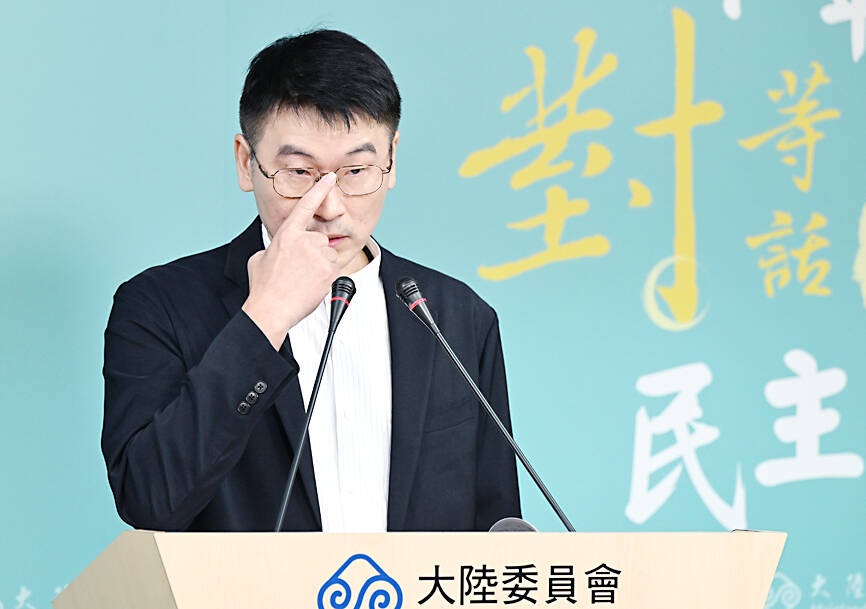Seventy-four percent of respondents in a survey administered by the Mainland Affairs Council (MAC) said that Chinese spouses must relinquish Chinese citizenship before becoming legislators or assuming government posts.
The council tasked National Chengchi University’s Election Research Center to gauge changes in public opinion on cross-strait issues.
The Act Governing Relations Between the People of the Taiwan Area and the Mainland Area (兩岸人民關係條例) stipulates that Chinese spouses can run for public office in Taiwan 10 years after obtaining an ID card, council Deputy Minister and spokesperson Liang Wen-chieh (梁文傑) said yesterday.

Photo: Liao Chen-huei, Taipei Times
“However, the Nationality Act (國籍法) requires foreign spouses to relinquish their nationalities other than that of the Republic of China (Taiwan) after they are elected. This is to avoid having divided loyalties,” Liang said.
“I cannot say for sure that Chinese spouses can successfully relinquish their Chinese citizenship, as I have not seen such cases,” he said.
Countries such as Argentina prohibit relinquishment of citizenship, and naturalized Taiwanese citizens from these countries would be asked to leave office if they still hold dual citizenship within one year after being elected, as per the Nationality Act, he said.
The survey also found that 89.5 percent of respondents did not agree with China’s moves to oppress Taiwan on the military, economic and diplomatic fronts, while 84.9 percent did not support Beijing’s characterization of Taiwan as an internal issue, nor did they agree that countries around the world should adhere to the so-called “one China” policy.
More than 86 percent of respondents did not support Taiwan being subject to “one country, two systems.”

CAUTION: Based on intelligence from the nation’s security agencies, MOFA has cautioned Taiwanese travelers about heightened safety risks in China-friendly countries The Ministry of Foreign Affairs (MOFA) yesterday urged Taiwanese to be aware of their safety when traveling abroad, especially in countries that are friendly to China. China in June last year issued 22 guidelines that allow its courts to try in absentia and sentence to death so-called “diehard” Taiwanese independence activists, even though Chinese courts have no jurisdiction in Taiwan. Late last month, a senior Chinese official gave closed-door instructions to state security units to implement the guidelines in countries friendly to China, a government memo and a senior Taiwan security official said, based on information gathered by Taiwan’s intelligence agency. The

The National Immigration Agency (NIA) said yesterday that it will revoke the dependent-based residence permit of a Chinese social media influencer who reportedly “openly advocated for [China’s] unification through military force” with Taiwan. The Chinese national, identified by her surname Liu (劉), will have her residence permit revoked in accordance with Article 14 of the “Measures for the permission of family- based residence, long-term residence and settlement of people from the Mainland Area in the Taiwan Area,” the NIA said in a news release. The agency explained it received reports that Liu made “unifying Taiwan through military force” statements on her online

Taiwan Semiconductor Manufacturing Co (TSMC), the world’s largest contract chipmaker, said yesterday that it is looking to hire 8,000 people this year, at a time when the tech giant is expanding production capacity to maintain its lead over competitors. To attract talent, TSMC would launch a large-scale recruitment campaign on campuses across Taiwan, where a newly recruited engineer with a master’s degree could expect to receive an average salary of NT$2.2 million (US$60,912), which is much higher than the 2023 national average of NT$709,000 for those in the same category, according to government statistics. TSMC, which accounted for more than 60 percent

A magnitude 5.7 earthquake struck off Taitung County at 1:09pm today, the Central Weather Administration (CWA) said. The hypocenter was 53km northeast of Taitung County Hall at a depth of 12.5km, CWA data showed. The intensity of the quake, which gauges the actual effect of a seismic event, measured 4 in Taitung County and Hualien County on Taiwan's seven-tier intensity scale, the data showed. The quake had an intensity of 3 in Nantou County, Chiayi County, Yunlin County, Kaohsiung and Tainan, the data showed. There were no immediate reports of damage following the quake.